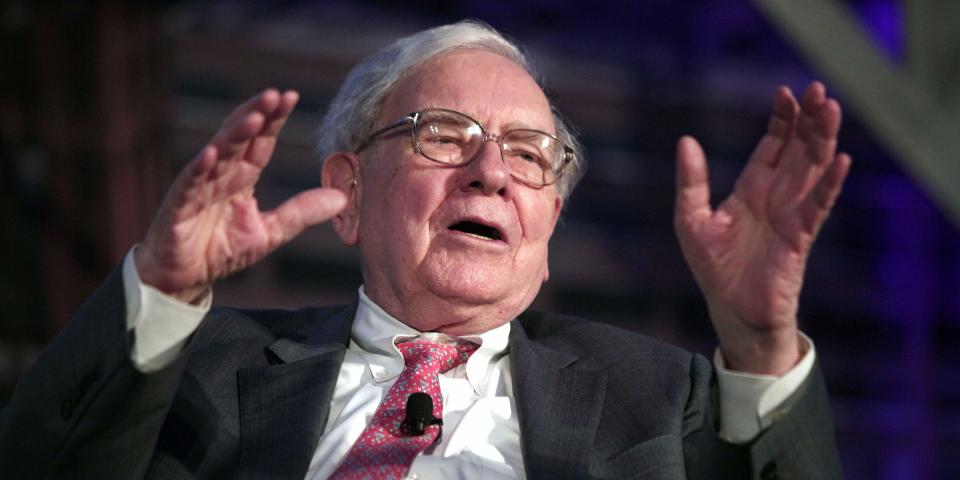Warren Buffett has weighed in on bank runs, bailouts and the dangers of insuring deposits. Here are 9 quotes that shed light on today's banking crisis.

Three banks folded last week, stoking fears of a banking crisis and a financial firestorm.
Warren Buffett has weighed in on bank runs, bailouts, and deposit insurance over the years.
Here are nine of Buffett's most relevant and insightful quotes about banks.
Silicon Valley Bank, Signature Bank, and Silvergate have all folded in recent days, fanning fears of a banking-sector meltdown and full-on financial crisis.
Warren Buffett, the world-famous stockpicker who runs Berkshire Hathaway, has been studying and investing in banks for more than five decades. Moreover, he's been offering guidance and advice to senior White House officials in recent days, and has discussed buying into ailing regional banks to help calm the current turmoil, reports say.
Some of the investor's remarks are strikingly relevant to the current furore around bank runs, government bailouts, deposit insurance, and poor risk management.
Here are Buffett's 9 best quotes about banks, lightly edited for length and clarity:
1. "It's a business that can be a very good business, when run right. There's no magic to it. You just have to stay away from doing something foolish. It's a little like investing. You don't have to do anything very smart. You just have to avoid doing things that are ungodly dumb." (1996)
2. "The banking business is no favorite of ours. When assets are 20 times equity — a common ratio in this industry — mistakes that involve only a small portion of assets can destroy a major portion of equity. And mistakes have been the rule rather than the exception at many major banks. In their lending, many bankers played follow-the-leader with lemming-like zeal; now they are experiencing a lemming-like fate." (1990)
3. "When you have a panic, you have to have someone, somewhere, who can say and be believed, and be correctly believed, that he or she will do whatever it takes." (2015)
4. "In the old days, the only way you could stop a run on a bank was, basically, for somebody to come and pile up gold. They used to race it to the branches that were having a problem. If the CEO of the bank came out and said, 'Our Basel II ratio is 11.4 percent,' the line would just lengthen. It would not get the job done. Gold got the job done." (2015)
5. "Normally, it is risky business to lend long at fixed rates and borrow short as we have been doing at Clayton. Over the years, some important financial institutions have gone broke doing that. At Berkshire, however, we possess a natural offset in that our businesses always maintain at least $20 billion in cash-equivalents that earn short-term rates. In banking terms, Berkshire is — and always will be — heavily asset-sensitive and will consequently benefit from rising interest rates." (SVB ran into trouble because it invested deposits, which could be withdrawn immediately, into long-dated bonds without adequately hedging its interest-rate risk.) (2015)
6. "At the moment, it is much better to be a financial cripple with a government guarantee than a Gibraltar without one." (Buffett was complaining that banks with FDIC-insured deposits, and other lenders with government guarantees, had minimal money costs and could borrow easily. In contrast, companies like Berkshire with AAA credit ratings and solid balance sheets found it harder and more costly to borrow.) (2008)
7. "When faced with large revenue shortfalls, communities that have all of their bonds insured will be more prone to develop 'solutions' less favorable to bondholders than those communities that have uninsured bonds held by local banks and residents." (Buffett was asserting that people work harder to minimize losses that affect their communities than if losses are borne by large insurers or the government. His comment speaks to the risk of "moral hazard" stemming from government-guaranteed bank deposits.) (2008)
8. "Before the Fed was established, the failure of weak banks would sometimes put sudden and unanticipated liquidity demands on previously strong banks, causing them to fail in turn. The Fed now insulates the strong from the troubles of the weak."
9. "At a minimum, the banker's conduct should rise to that of a responsible bartender who, when necessary, refuses the profit from the next drink to avoid sending a drunk out on the highway. In recent years, unfortunately, many leading investment firms have found bartender morality to be an intolerably restrictive standard. Lately, those who have traveled the high road in Wall Street have not encountered heavy traffic."
Read the original article on Business Insider

